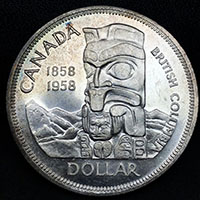
History-Periods
Past eras

From pre-history to today
Choose your period

Pre history - Present
explore the different eras

The Colony of British Columbia was a British colony in what is now the province of British Columbia, Canada. It was founded in 1858 by James Douglas, the Governor of the Colony of Vancouver Island, who was sent to establish a new settlement on the mainland after the discovery of gold in the Fraser River.
In 1849, the British government had established the Colony of Vancouver Island, which included the southern part of what is now the province of British Columbia. However, the discovery of gold in the Fraser River in 1858 led to a significant influx of prospectors and other settlers to the mainland, which prompted the British government to establish a separate colony on the mainland to better govern the area.
British Columbia (BC) is a province located on the west coast of Canada. It was originally a British colony and became a province of Canada in 1871.
Before becoming a province, BC was a separate colony with its own government. The colony was established in 1858, following the Fraser River gold rush. At the time, BC was not yet part of the Confederation of Canada, which was a union of several British North American colonies that formed the country of Canada in 1867.
In the late 1860s, negotiations began between the colony of BC and the federal government of Canada to join Confederation. The main incentive for BC to join Confederation was the promise of a transcontinental railway to connect the province to the rest of Canada. The railway was seen as essential for the economic development of the region and for the integration of BC into the rest of the country.
In 1871, BC officially became a province of Canada. The construction of the transcontinental railway began later that year, and the province officially joined Confederation on July 20, 1871.
Timeline
The formation of the Colony of British Columbia was a complex process that involved a number of individuals and events. Here is a detailed account of how it came to be:
Background:
In the mid-19th century, the Pacific Northwest region of North America was a contested territory between Britain and the United States. The border between the two countries had not yet been definitively established, and both sides claimed the region as their own. The British, who controlled the region through the Hudson's Bay Company, were concerned that the Americans might try to annex the territory and establish a new state.
Discovery of Gold:
In 1858, gold was discovered in the Fraser River in what is now British Columbia. News of the discovery quickly spread, and soon thousands of miners and prospectors were flocking to the region in search of fortune. Many of these newcomers were from the United States, which increased British fears that the region might be annexed by the Americans.
Establishment of the Colony:
To assert its control over the region and to provide some order to the chaos caused by the gold rush, the British government decided to establish a new colony in the region. On August 2, 1858, the Colony of British Columbia was formally established by an act of the British Parliament.
The first governor of the colony was James Douglas, who was also the governor of the nearby Colony of Vancouver Island. Douglas was an experienced administrator and had previously served as governor of the Hudson's Bay Company's Columbia District, which encompassed much of the Pacific Northwest.
Challenges and Obstacles:
The early years of the colony were marked by a number of challenges and obstacles. The government was small and inexperienced, and there were tensions between the newcomers and the Indigenous peoples of the region. There were also conflicts between the British and the Americans over the border, which was eventually settled in 1846 with the signing of the Oregon Treaty.
Douglas and his government had to work hard to establish order and stability in the region. They negotiated treaties with the Indigenous peoples to secure land for settlement and established a police force to maintain law and order. They also encouraged the development of industries such as mining, logging, and fishing to stimulate the economy and attract settlers.
Success and Legacy:
Despite the challenges, the Colony of British Columbia was ultimately successful in establishing itself as a thriving and prosperous region. Its population grew rapidly, and it became an important center of trade and commerce. In 1866, the colony was united with the Colony of Vancouver Island to form the united colony of British Columbia and Vancouver Island, which eventually became a province of Canada in 1871.
James Douglas, the first governor of the Colony of British Columbia, is remembered as an important figure in the region's history. He played a key role in negotiating treaties with Indigenous peoples and in promoting economic development in the region. His legacy is celebrated in British Columbia with a number of landmarks and institutions named in his honor, including the city of Port Douglas, the Douglas fir tree, and the Douglas College in New Westminster.
British Columbiahistory.ca is a visitor supported web site. If you would like to submit an article or opinion, please visit our blog at www.blog.British Columbiahistory.ca.
Reference: Article by (Staff Historian), 2023
Tour Reviews
History Attractions
Submit Tour Suggestions
2023/Departures
Spotlight Tours
Events and anniversaries

All content and images are protected by copyright to Access History